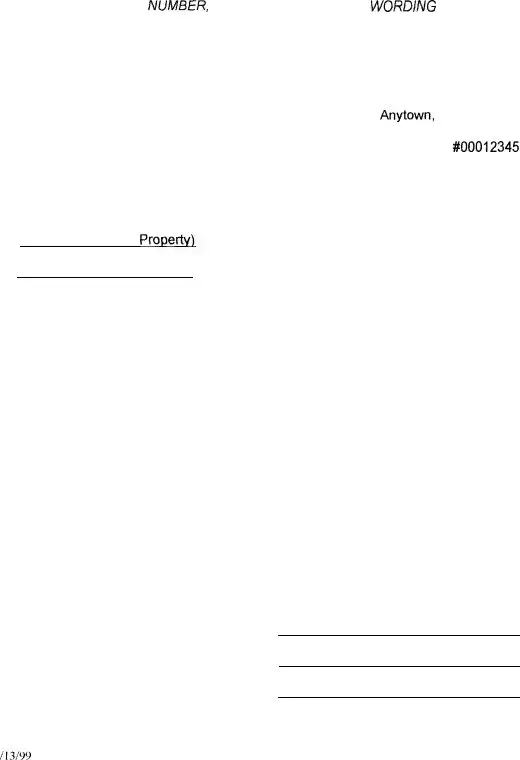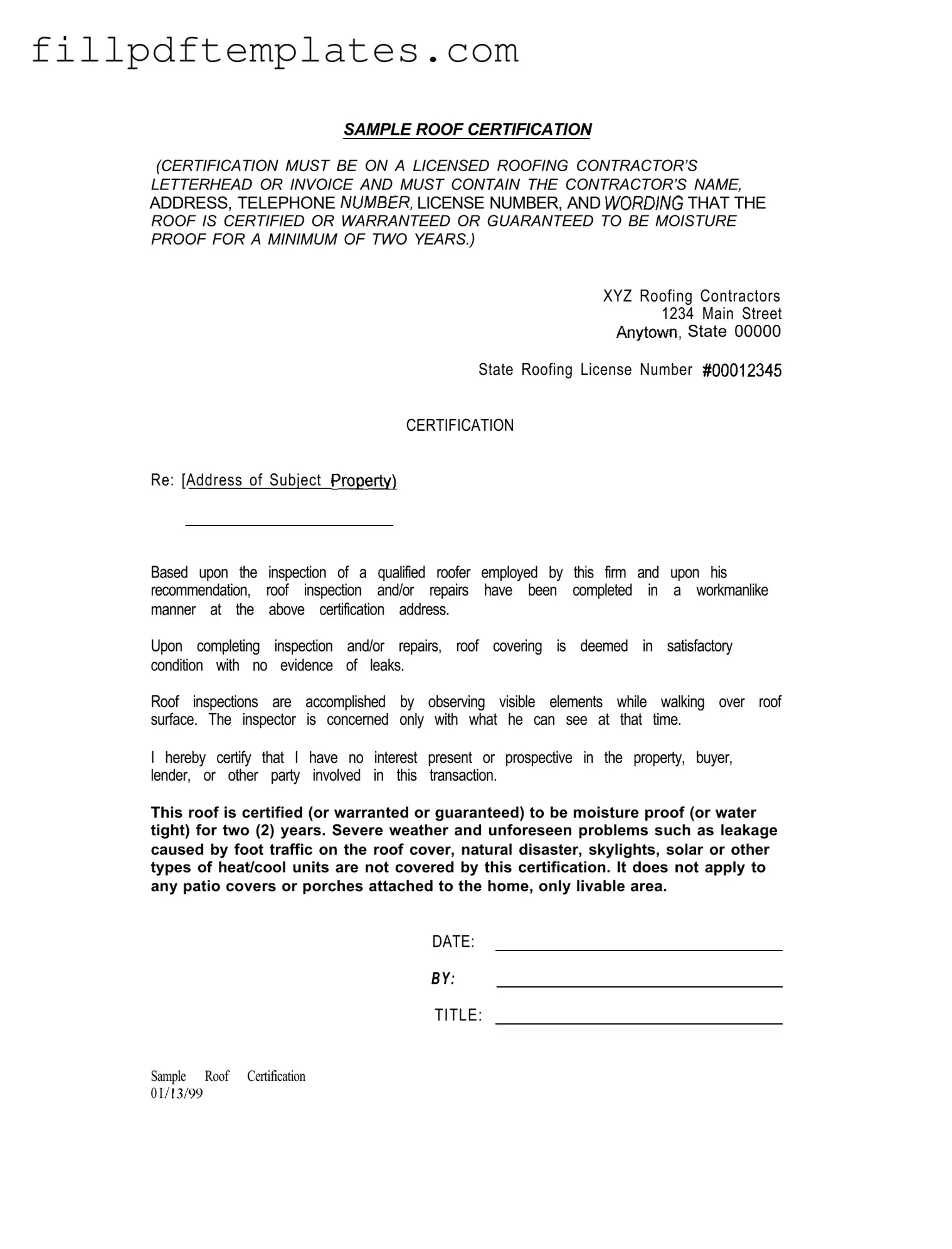Fill a Valid Sample Roof Certification Template
The Sample Roof Certification form serves as a crucial document in the real estate and construction industries, providing essential assurance to property owners and potential buyers regarding the integrity of a roof. This certification must be issued on the official letterhead or invoice of a licensed roofing contractor, ensuring that it includes vital details such as the contractor's name, address, telephone number, and license number. The form explicitly states that the roof is certified, warranted, or guaranteed to be moisture-proof for a minimum duration of two years. Following a thorough inspection by a qualified roofer, the certification confirms that any necessary repairs have been completed in a professional manner, and that the roof is in satisfactory condition without visible leaks. It is important to note that the inspection process is limited to observable elements, meaning that hidden issues may not be detected. Additionally, the certification disclaims liability for damages resulting from severe weather or other unforeseen circumstances, as well as for any structures not classified as livable areas. This comprehensive overview of the Sample Roof Certification form highlights its significance in safeguarding the interests of all parties involved in property transactions.
Additional PDF Templates
California Corrective Deed - This document plays a crucial part in legal record-keeping.
A Hold Harmless Agreement form is a legal document used to protect one party from liability for any damages or injuries sustained by another party during the involvement in an activity. In Idaho, this form is commonly utilized in situations involving high-risk activities, property use, or various services. It's an essential tool for ensuring that individuals and businesses can operate with a level of security against potential legal claims, as outlined in the Hold Harmless Agreement.
Tattoo Contract - It states that the laws of a specific state will govern the agreement.
Dr-835 - The Tax POA DR 835 allows for better management of audits and tax correspondence.
Similar forms
The Sample Roof Certification form shares similarities with several other documents commonly used in real estate and construction. Here are four documents that are comparable:
- Home Inspection Report: Like the roof certification, a home inspection report provides an assessment of the property's condition. It details the findings of a qualified inspector, including any issues related to the roof, structure, and systems within the home. Both documents aim to inform buyers and lenders about the property's state.
ATV Bill of Sale: This form is essential for the legal transfer of an ATV's ownership in Arizona, detailing necessary information such as the vehicle's identification number and the purchase price. For more information, visit arizonaformpdf.com.
- Warranties for Roofing Materials: Roofing material warranties guarantee that the materials used will perform as expected for a specified period. Similar to the roof certification, these warranties assure the property owner that the roof will remain free from defects and leaks, though they may not cover all types of damage.
- Property Disclosure Statement: This document requires sellers to disclose known issues with the property, including roofing problems. Both the property disclosure statement and the roof certification serve to protect buyers by providing transparency about the condition of the roof and other aspects of the property.
- Insurance Policy for Homeowners: A homeowners insurance policy often covers roof damage due to specific events, such as storms. While the roof certification guarantees the roof's condition for a limited time, the insurance policy offers financial protection against unforeseen damages, making both documents essential in safeguarding property investments.
Document Specifics
| Fact Name | Details |
|---|---|
| Form Requirement | The certification must be on a licensed roofing contractor’s letterhead or invoice. |
| Contractor Information | It must include the contractor’s name, address, telephone number, and license number. |
| Certification Duration | The roof is guaranteed to be moisture-proof for a minimum of two years. |
| Inspection Process | Inspections are conducted by a qualified roofer who assesses visible elements of the roof. |
| Scope of Certification | This certification does not cover damage from severe weather or issues caused by foot traffic. |
| Exclusions | It does not apply to patio covers or porches; it only covers livable areas. |
| Governing Law | State-specific regulations may apply; check local laws for compliance. |
Things You Should Know About This Form
-
What is a Roof Certification?
A Roof Certification is a document provided by a licensed roofing contractor that verifies the condition of a roof. It states that the roof has been inspected and is deemed to be in satisfactory condition, free from leaks, and moisture proof for a minimum of two years.
-
What information must be included in the Roof Certification?
The Roof Certification must be on the letterhead or invoice of a licensed roofing contractor. It should contain the contractor’s name, address, telephone number, license number, and a statement indicating that the roof is certified, warranted, or guaranteed to be moisture proof for at least two years.
-
How long is the roof certified to be moisture proof?
The certification guarantees that the roof will be moisture proof or water tight for a period of two years from the date of certification.
-
What does the roof inspection involve?
The roof inspection involves a qualified roofer visually examining the roof surface. The inspector looks for visible elements and assesses the roof's condition based on what can be seen at the time of inspection. It does not include any hidden issues that may not be apparent.
-
Are there any limitations to the Roof Certification?
Yes, the certification does not cover damage caused by severe weather, natural disasters, or issues arising from foot traffic on the roof. It also excludes any problems related to skylights, solar units, or patio covers and porches attached to the home.
-
Who can issue a Roof Certification?
A Roof Certification can only be issued by a licensed roofing contractor. It is important that the contractor is qualified and has no interest in the property or transaction to ensure impartiality.
-
What should I do if I have a problem with my roof after certification?
If you experience issues with your roof after receiving the certification, it is advisable to contact the roofing contractor who issued the certification. They can provide guidance on whether the problem falls under the certification terms.
-
Is the Roof Certification transferable?
The Roof Certification is generally tied to the specific property and may not be transferable to new owners. It is recommended to check with the roofing contractor for their policy regarding transferability.
-
Can I use a Roof Certification for insurance purposes?
Yes, a Roof Certification can be used for insurance purposes. It may help in obtaining or renewing homeowner's insurance by demonstrating that the roof is in good condition and free from leaks.
-
What happens if the roof leaks during the certification period?
If the roof leaks during the certification period, the homeowner should refer to the terms of the certification. The roofing contractor may be obligated to address the issue, depending on the cause and the specific terms outlined in the certification.
Documents used along the form
When dealing with roofing certifications, several other documents often accompany the Sample Roof Certification form. Each of these documents plays a vital role in ensuring that all parties involved have a clear understanding of the roof's condition, warranty details, and any necessary agreements. Below is a list of commonly used forms and documents that can enhance the roofing certification process.
- Roof Inspection Report: This document provides a detailed account of the roof's current condition, including any issues or areas of concern identified during the inspection. It serves as a foundation for the certification and helps inform potential repairs.
- Contractor License Verification: This form confirms that the roofing contractor is licensed and authorized to perform roofing work in the state. It ensures that the contractor meets all legal requirements and standards.
- Warranty Agreement: This document outlines the terms of the warranty provided by the roofing contractor. It specifies what is covered, the duration of the warranty, and any conditions that may void it.
- Service Agreement: This agreement details the services to be performed by the roofing contractor. It includes the scope of work, payment terms, and timelines, ensuring that both parties are aligned on expectations.
- Change Order Form: If any modifications to the original work plan are necessary, a change order form documents these adjustments. It outlines the changes, any additional costs, and the impact on the project timeline.
- Completion Certificate: Once the roofing work is finished, this certificate verifies that the contractor has completed the project according to the agreed-upon specifications and standards.
- Insurance Certificate: This document proves that the roofing contractor carries the necessary insurance coverage, protecting both the contractor and the property owner from potential liabilities during the project.
- Motor Vehicle Bill of Sale: In Florida, this legal document records the sale and purchase of a vehicle, providing essential proof of transaction. To learn more or to access the document, visit the appropriate resources to ensure compliance and protection for both parties involved in the sale.
- Building Permit: A building permit may be required for roofing work, depending on local regulations. This document ensures that the project complies with zoning laws and building codes.
- Final Inspection Report: After the completion of the roofing work, a final inspection report confirms that the roof meets all safety and quality standards. It provides reassurance to the property owner about the integrity of the roof.
Each of these documents plays a crucial role in the roofing certification process. By understanding their purpose and importance, property owners and contractors can work together more effectively, ensuring a smooth and transparent transaction. Proper documentation not only protects all parties involved but also promotes trust and accountability in the roofing industry.
Sample Roof Certification Preview

SAMPLE ROOF CERTIFICATION
(CERTIFICATION MUST BE ON A LICENSED ROOFING CONTRACTOR’S LETTERHEAD OR INVOICE AND MUST CONTAIN THE CONTRACTOR’S NAME,
ADDRESS, TELEPHONE NUMSER, LICENSE NUMBER, AND WORDlNG THAT THE
ROOF IS CERTIFIED OR WARRANTEED OR GUARANTEED TO BE MOISTURE PROOF FOR A MINIMUM OF TWO YEARS.)
XYZ Roofing Contractors
1234 Main Street
Anytown, State 00000
State Roofing License Number #00012345
CERTIFICATION
Re: [Address of Subject Property)
Based upon the inspection of a qualified roofer employed by this firm and upon his recommendation, roof inspection and/or repairs have been completed in a workmanlike manner at the above certification address.
Upon completing inspection and/or repairs, roof covering is deemed in satisfactory condition with no evidence of leaks.
Roof inspections are accomplished by observing visible elements while walking over roof surface. The inspector is concerned only with what he can see at that time.
I hereby certify that I have no interest present or prospective in the property, buyer, lender, or other party involved in this transaction.
This roof is certified (or warranted or guaranteed) to be moisture proof (or water tight) for two (2) years. Severe weather and unforeseen problems such as leakage caused by foot traffic on the roof cover, natural disaster, skylights, solar or other types of heat/cool units are not covered by this certification. It does not apply to any patio covers or porches attached to the home, only livable area.
DATE:
BY:
TITLE:
Sample Roof Certification 0I/13/w
